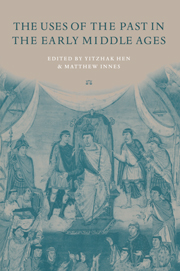Book contents
- Frontmatter
- Contents
- List of contributors
- Acknowledgements
- List of abbreviations
- Introduction: using the past, interpreting the present, influencing the future
- 1 Memory, identity and power in Lombard Italy
- 2 Memory and narrative in the cult of early Anglo-Saxon saints
- 3 The uses of the Old Testament in early medieval canon law: the Collectio Vetus Gallica and the Collectio Hibernensis
- 4 The transmission of tradition: Gregorian influence and innovation in eighth-century Italian monasticism
- 5 The world and its past as Christian allegory in the early Middle Ages
- 6 The Franks as the New Israel? Education for an identity from Pippin to Charlemagne
- 7 Political ideology in Carolingian historiography
- 8 The Annals of Metz and the Merovingian past
- 9 The empire as ecclesia: Hrabanus Maurus and biblical historia for rulers
- 10 Teutons or Trojans? The Carolingians and the Germanic Past
- 11 A man for all seasons: Pacificus of Verona and the creation of a local Carolingian past
- APPENDIX: The Memorial to Pacificus of Verona
- Index
3 - The uses of the Old Testament in early medieval canon law: the Collectio Vetus Gallica and the Collectio Hibernensis
Published online by Cambridge University Press: 14 August 2009
- Frontmatter
- Contents
- List of contributors
- Acknowledgements
- List of abbreviations
- Introduction: using the past, interpreting the present, influencing the future
- 1 Memory, identity and power in Lombard Italy
- 2 Memory and narrative in the cult of early Anglo-Saxon saints
- 3 The uses of the Old Testament in early medieval canon law: the Collectio Vetus Gallica and the Collectio Hibernensis
- 4 The transmission of tradition: Gregorian influence and innovation in eighth-century Italian monasticism
- 5 The world and its past as Christian allegory in the early Middle Ages
- 6 The Franks as the New Israel? Education for an identity from Pippin to Charlemagne
- 7 Political ideology in Carolingian historiography
- 8 The Annals of Metz and the Merovingian past
- 9 The empire as ecclesia: Hrabanus Maurus and biblical historia for rulers
- 10 Teutons or Trojans? The Carolingians and the Germanic Past
- 11 A man for all seasons: Pacificus of Verona and the creation of a local Carolingian past
- APPENDIX: The Memorial to Pacificus of Verona
- Index
Summary
The Bible was arguably the most important historiographical text of the early Middle Ages. All history was in the end part of God's scheme of salvation for human kind, starting with creation and ending at the last coming. Early medieval historiography was concerned to establish its own place in this great scheme of creation, fall and redemption. Yet, the Bible is not only a historiographical text; it is also a code of moral conduct. In particular the Old Testament books of Leviticus and Deuteronomy supply God's chosen people with a detailed lawcode. One of the crucial problems for Christians was the question of how far Old Testament rules also applied to them. In Mediterranean Christianity with its enduring tradition of exegesis and ecclesiastical legislation, the episcopacy felt a certain tension between on the one hand certain Old Testament rules, in particular those touching upon the subject of ritual purity, and on the other proper Christian conduct. This attitude changed in the early Middle Ages when the prestige of the Old Testament increased to such a degree that for a Carolingian scholar and adviser of kings as Hrabanus Maurus the vetus lex, the ‘Old Law’, was of primary importance in dealing with contemporary matters. This chapter investigates some of the ways in which early medieval compilers of canon law collections dealt with the ‘Old Law’.
- Type
- Chapter
- Information
- The Uses of the Past in the Early Middle Ages , pp. 67 - 77Publisher: Cambridge University PressPrint publication year: 2000
- 4
- Cited by

